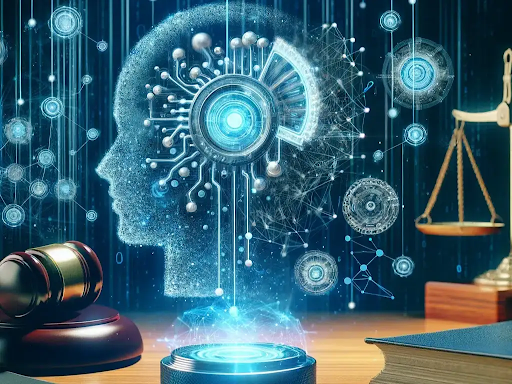GenAI Legal Investigations: Transforming Legal Analytics?
The legal landscape in Australia, and particularly in major cities like Sydney, is undergoing a significant shift driven by Generative AI (GenAI). Unlike traditional AI that focuses on specific tasks, GenAI can analyze vast amounts of data, identify patterns, and even generate creative solutions – fundamentally altering how legal investigations are conducted.
This shift promises to streamline investigative processes through automation, unlock deeper insights through advanced analytics, and pave the way for a more efficient and accurate legal system. Let's delve deeper into GenAI's applications and implications for the legal field, specifically considering its potential benefits for Sydney private investigators.
Understanding GenAI in Legal Contexts
The Basics of GenAI and Its Capabilities
GenAI goes beyond simply analyzing data. It can learn from vast legal documents, case studies from Australian courts, and even predict potential outcomes based on local legal precedents. This allows GenAI to:
- Generate legal documents with greater speed and precision, adhering to specific formatting and compliance requirements for Sydney courts.
- Identify relevant information from mountains of legal data, including public records, social media data (while adhering to Australian privacy laws), and financial documents.
- Analyze complex contracts specific to Australian business practices and pinpoint potential risks based on local legal interpretations.
- Uncover hidden connections within evidence that might be missed by human investigators, even when dealing with multilingual documents common in Sydney's diverse community.
Enhancing Evidence Analysis with GenAI
Case Studies of GenAI in Action
Imagine GenAI analyzing financial records from Australian banks to detect fraudulent patterns or sifting through social media data relevant to Sydney residents to identify potential witnesses. These are just a few examples of how GenAI is being used to:
- Analyze vast datasets for hidden connections and patterns, including geospatial data relevant to investigations within Sydney.
- Automate time-consuming tasks like document review and evidence identification, freeing up valuable time for Sydney private investigators to focus on strategic case development and client communication.
- Generate leads and uncover previously unknown evidence sources, including online resources specific to Australian legal proceedings.
GenAI's Role in Legal Document Analysis
Automating Contract Review and Compliance Checks
Legal professionals in Sydney spend countless hours poring over contracts specific to Australian business practices and ensuring compliance with local regulations. GenAI can revolutionize this process for Sydney-based legal teams and private investigators by:
- Automating contract review for inconsistencies and potential risks based on relevant Australian legal statutes.
- Streamlining compliance checks with local regulations, ensuring adherence to data privacy laws like the Australian Privacy Act (1988).
- Generating standardized legal documents based on pre-defined templates compliant with Sydney court requirements.
Ethical and Legal Challenges of GenAI
Navigating Privacy and Accuracy Concerns
As with any powerful technology, GenAI raises ethical and legal questions, particularly regarding Australian privacy laws. We must ensure:
- Privacy protection: GenAI algorithms should not infringe on individual privacy rights as outlined in the Australian Privacy Act (1988).
- Data bias: AI models are only as good as the data they are trained on, so mitigating bias in datasets used to train GenAI for legal applications in Sydney is crucial. This includes ensuring the data reflects the diversity of the Australian population.
- Transparency and explainability: Legal professionals need to understand GenAI's reasoning behind its insights, especially when dealing with complex legal matters in Sydney courts.
Conclusion
GenAI holds immense potential to transform legal investigations, leading to greater efficiency, accuracy, and ultimately, more just legal outcomes. As with any new technology, ongoing research and ethical considerations are crucial in harnessing its power for good. By fostering a responsible and innovative legal landscape, GenAI can usher in a new era of legal analysis and problem-solving, particularly for Sydney-based private investigators.
FAQs About Integrating GenAI in Legal Investigations
What is GenAI and how is it applied in legal investigations?
GenAI is a powerful form of AI that can analyze vast amounts of legal data, generate creative solutions, and automate tasks. In legal investigations, GenAI can be applied to:
- Identify evidence by sifting through mountains of documents, financial records, and social media data (while adhering to privacy laws).
- Analyze contracts and pinpoint potential risks based on local legal precedents.
- Uncover hidden connections within evidence that might be missed by human investigators.
How can GenAI enhance the analysis of evidence?
GenAI can enhance evidence analysis by:
- Identifying patterns and connections within vast datasets, including geospatial data relevant to specific investigations.
- Automating time-consuming tasks like document review, freeing up investigators to focus on strategic analysis.
- Generating leads and uncovering previously unknown evidence sources, including online resources specific to Australian legal proceedings.
What are the benefits of using GenAI for legal document analysis?
GenAI offers several benefits for legal document analysis, including:
- Increased Speed and Accuracy: GenAI can automate contract review, ensuring consistency and adherence to specific formatting requirements for Sydney courts.
- Improved Efficiency: Streamlining compliance checks with local regulations like the Australian Privacy Act (1988) saves valuable time.
- Enhanced Risk Management: GenAI can analyze complex contracts and pinpoint potential risks based on relevant Australian legal interpretations.
What ethical concerns arise with the use of GenAI in legal settings?
As with any powerful technology, GenAI raises ethical concerns, particularly regarding Australian privacy laws. These concerns include:
- Privacy Protection: Ensuring GenAI algorithms do not infringe on individual privacy rights as outlined in the Australian Privacy Act (1988).
- Data Bias: Mitigating bias in datasets used to train GenAI for legal applications in Sydney is crucial, ensuring the data reflects the diversity of the Australian population.
- Transparency and Explainability: Legal professionals need to understand GenAI's reasoning behind its insights, especially when dealing with complex legal matters in Sydney courts.




